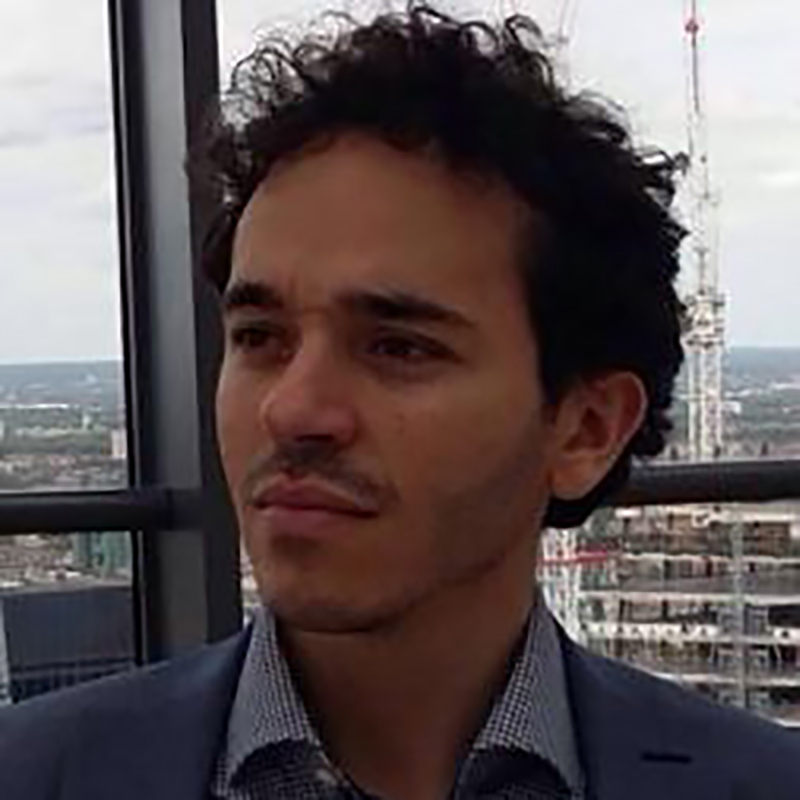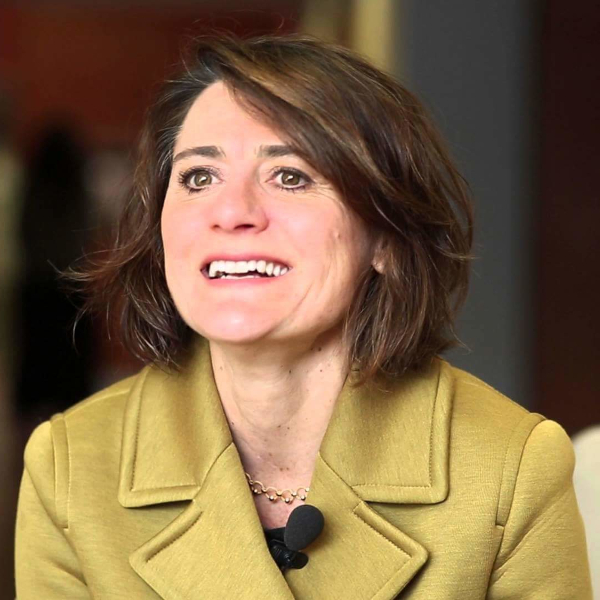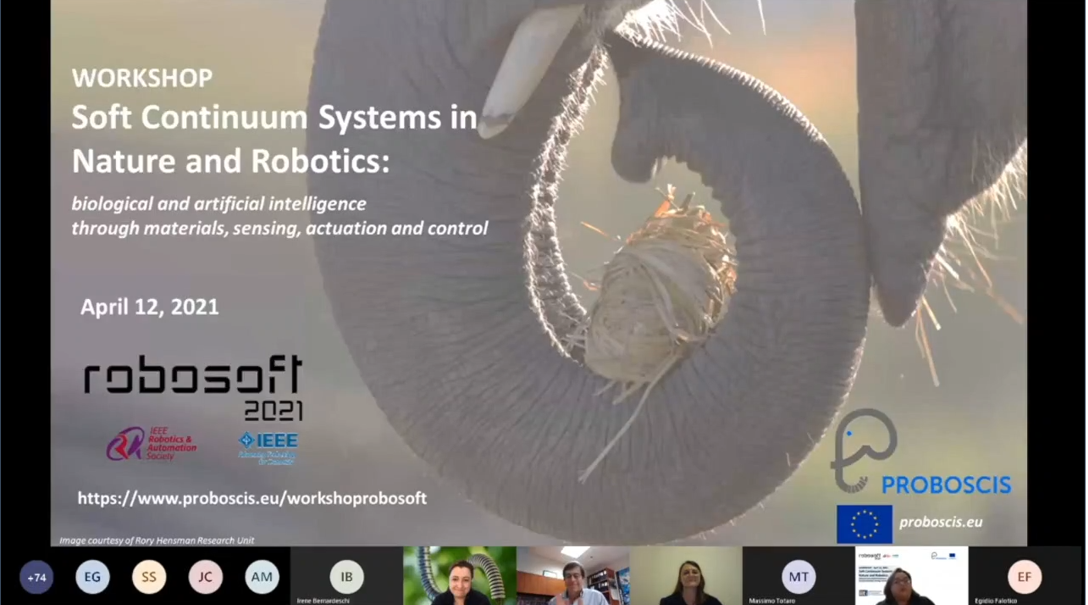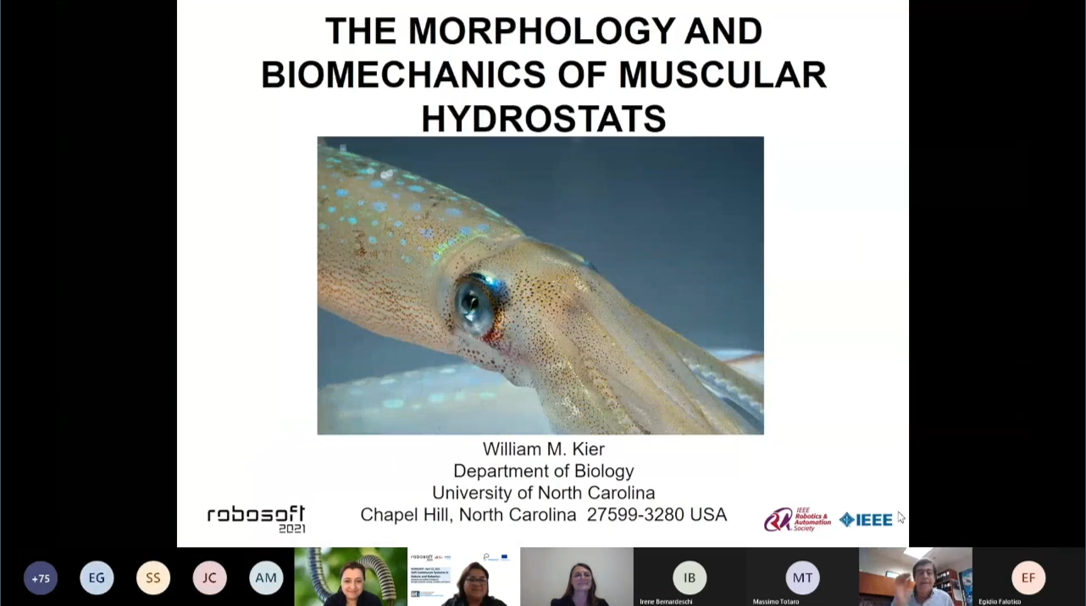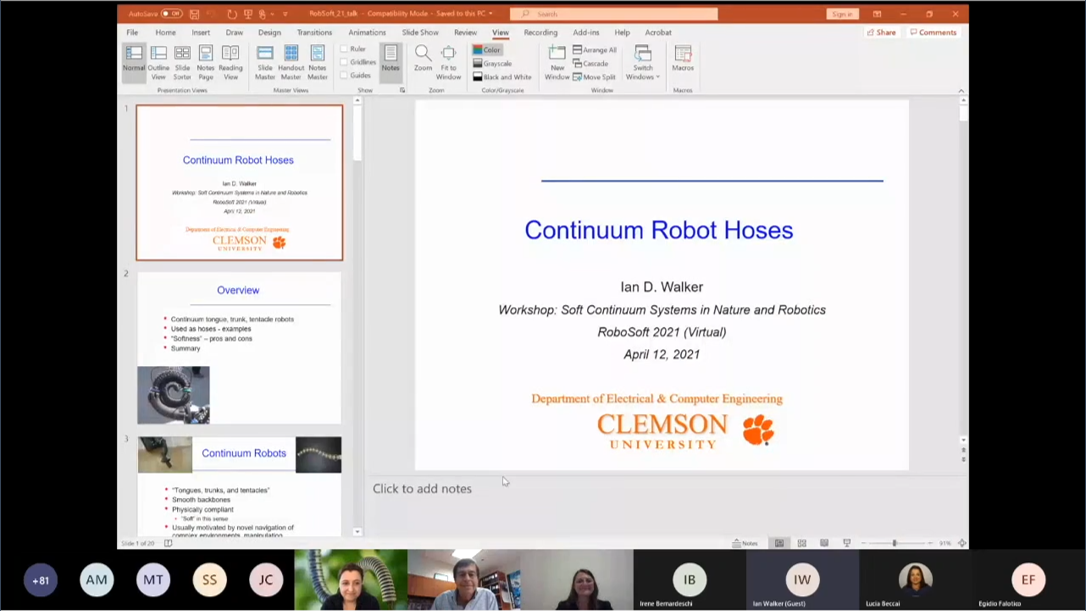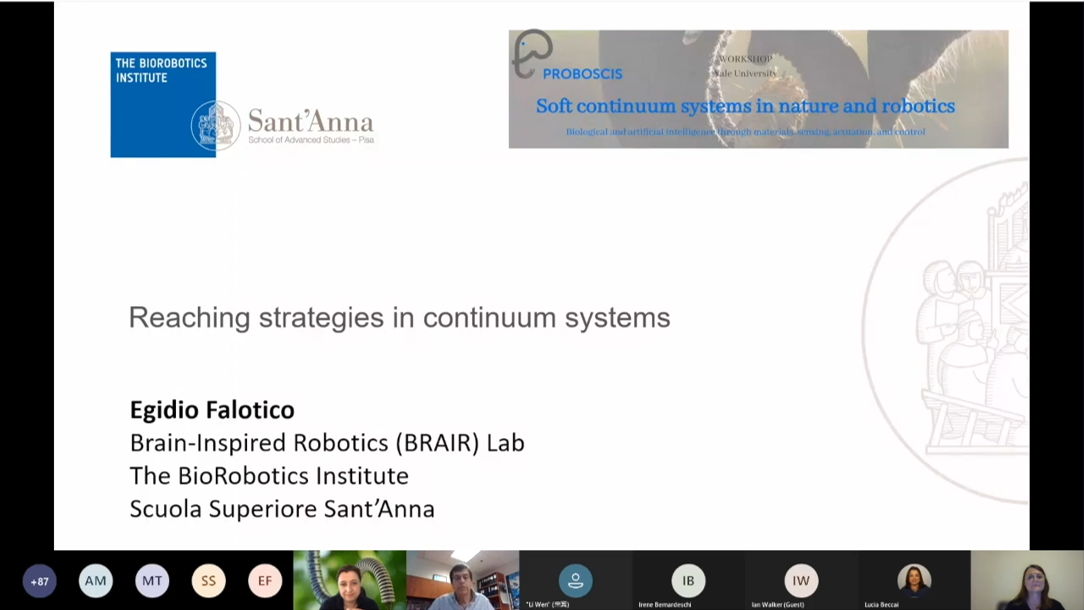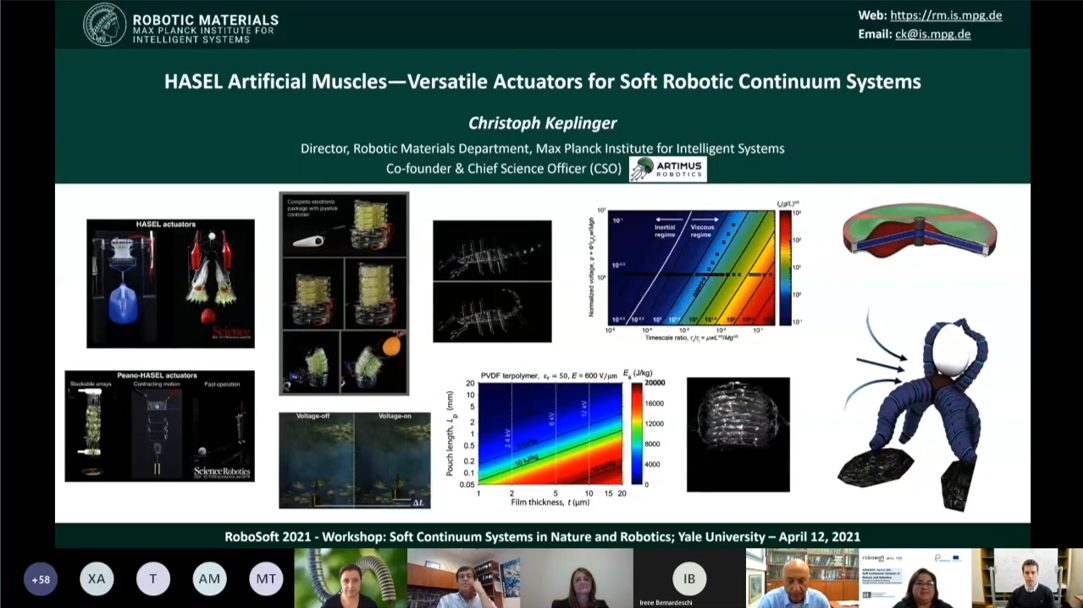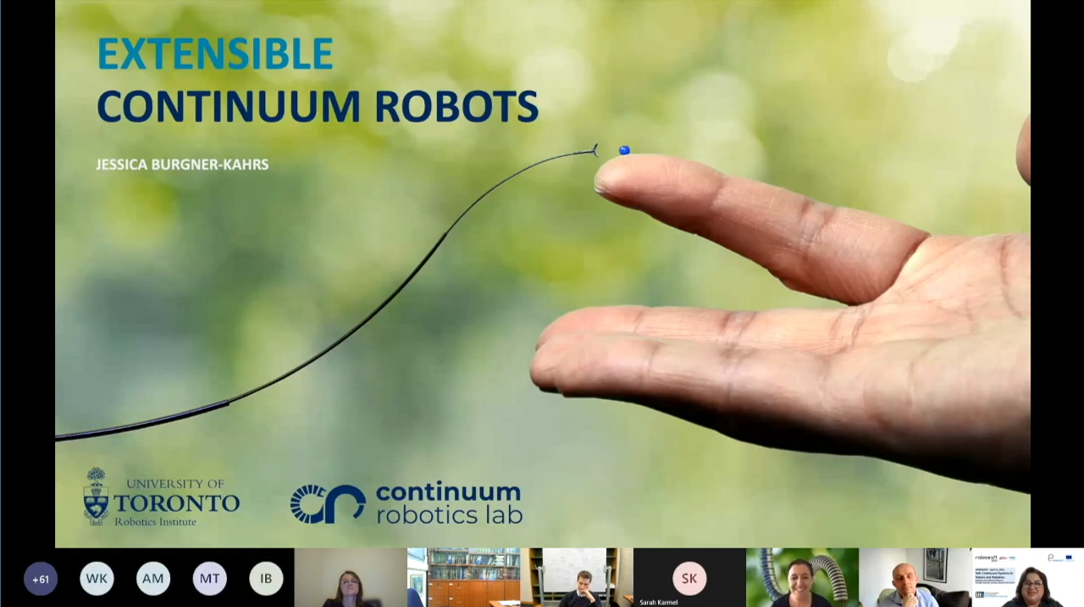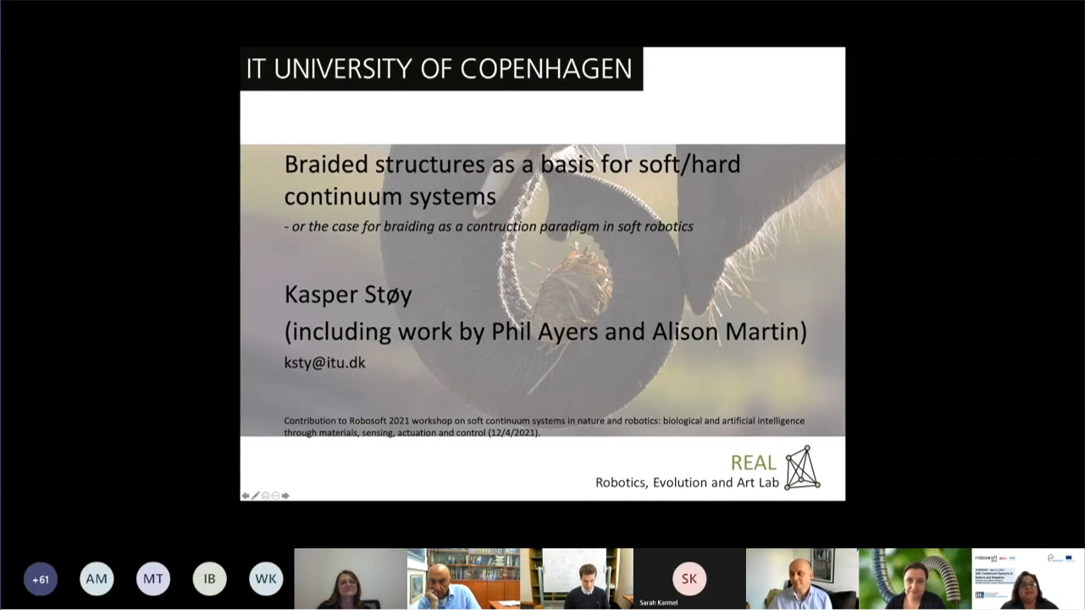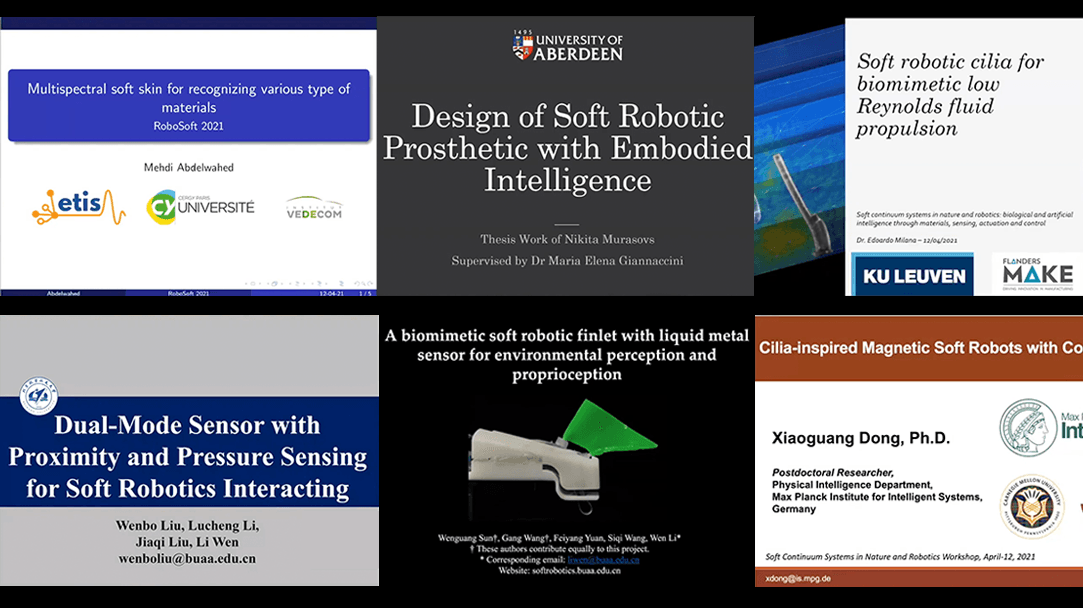

Many living beings owe to inherent continuum structures their capability to adapt to the environment and perform a multitude of tasks otherwise impossible. Studying biological models, like elephant trunks, octopus’ arms, and plants can provide insights on new and efficient ways of embodying intelligence by structure, actuation, sensing and control. Then in artificial designs, it is necessary to avoid discretization of the different embedded functionalities and material characteristics, as it seems to be one of the keys to soft robotic versatility - and today several material and fabrication approaches are holding promise in this direction. Among the open challenges are the smooth integration between sensing and actuation, together with distributed extero-proprio sensorial feedback from the continuum structure needed to ease the generation of complex control strategies.
>In this workshop, we aim to gather scientists from biology, material science, and robotics. We will highlight interesting characteristics of continuum structures in nature, and discuss possible new technological approaches for future development of soft robots, able to make smooth and robust controlled transitions among tasks, including grasping and manipulation of a wide diversity of items, growing and climbing in different environments, and more.
Description
The workshop focuses on some continuum structures that can be observed in nature, like the elephant trunk, and on the advantages, they give by enabling a multitude of tasks otherwise impossible. Similar structures in robotics may enable unprecedented tasks: continuum robots can bend, but also extend/contract and sometimes twist at any point along with their structure. This provides them with capabilities beyond the scope of their rigid-link counterparts in grasping and manipulation, as well as in a variety of other functions. As it will be highlighted through the talks, if, from one side, the potentiality of the approach has been recognised by roboticists, who are funnelling the morphological characteristics of natural continuum structures in the design of bio-inspired robots; on the other side, these new artefacts still show limited sensors integration, basic control capabilities and limited force generation. The workshop aims at providing a meeting point for the main disciplines involved in the challenge of building a new generation of continuum, sensorized robots: biology, material science and robotics. The workshop then includes lectures on the principles of continuum structures in nature, like muscular hydrostats; presentations of the advances in smart materials and fabrication techniques, and descriptions of the robotics technologies involved in continuum actuation, sensing and control. Within this workshop we do not aim at providing answers to the technological problems rather at presenting insights and challenges, and at stimulating an interdisciplinary discussion, raising new questions for research. The workshop consists of a number of scheduled short talks, on the topics described above, and includes two more sessions, open to discussion and presentations from the communities involved. A session will be devoted to short ‘pitches’ of abstracts that will be selected through an open call. A final discussion session will be devoted to raising issues, outlining challenges and drawing conclusions on the research questions ahead. The multidisciplinary approach will stimulate creativity and interactions among participants. The audience of the workshop will consist of researchers from different disciplines (robotics, biology, material science, and more), and the high technological and scientific level of the topics addressed can make an impact on young researchers and students at the Master and PhD level. The workshop derives from the activities of the PROBOSCIS project (https://www.proboscis.eu), funded by the EC to a consortium of 5 partners, led by the Italian Institute of Technology. The project provides further opportunities for dissemination and for reaching out to diverse scientific communities.
Organizers
Invited Speakers
| Name | Affiliation | Country |
|---|---|---|
Jessica Burgner-Kahrs | University of Toronto Mississauga | Canada |
Paule Dagenais | University of Geneva | Switzerland |
Helmut Hauser | University of Bristol | United Kingdom |
David Hu | Georgia Tech | USA |
Sarah Karmel | Photocentric | United Kingdom |
Christoph Keplinger | Max Planck Institute for Intelligent Systems | Germany |
William M. Kier | University of North Carolina at Chapel Hill | USA |
Shlomo Magdassi | The Hebrew University of Jerusalem | Israel |
Kasper Stoy | University of Copenhagen | Denmark |
Ian D. Walker | Clemson University | USA |
Li Wen | Beihang University | China |
Program
| Time (UTC-4) | Speaker | Title | |
|---|---|---|---|
08:00-08:15 | Lucia Beccai | Welcome and introduction to the workshop | View |
Session 1
Chair: Cecilia Laschi
08:15-08:30 | William M. Kier | The morphology and biomechanics of muscular hydrostats | View |
08:30-08:45 | Ian D. Walker | Continuum robot hoses | View |
08.45-09.00 | Li Wen | Design, sensing, and modeling of bio-inspired continuum soft robots for delicate grasping | |
09:00-09:15 | Egidio Falotico | Reaching strategies in continuum systems | View |
09:15-09:30 | Paule Dagenais | Methods for behavioral experiments with elephants | |
09:30-09:45 | Helmut Hauser | Design through Interaction – How the body can learn from the environment | View |
09.45-10:15 | Abstract pitches (3’ each) | View | |
10:15-11:00 | Q&A and PANEL DISCUSSION (45’) | W. M. Kier, I. D. Walker, L. Wen, E. Falotico, P. Dagenais, H. Hauser Chair: Cecilia Laschi | |
11:00-11:15 | Break |
Session 2
Chair: Lucia Beccai
11:15-11:30 | Shlomo Magdassi | 3D & 4D printing for soft robotics | View |
11:30-11:45 | Christoph Keplinger | HASEL Artificial Muscles—Versatile actuators for soft robotic continuum systems | View |
11:45-12:00 | Sarah Karmel | Visible light 3D printing for continuum structures | View |
12:00-12:15 | Jessica Burgner-Kahrs | Extensible continuum robots | View |
12:15-12:30 | Kasper Stoy | Braided structures as a basis for soft/hard continuum systems | View |
12:30-12:45 | David Hu | Biomechanics of the elephant trunk | |
12:45-13:30 | Q&A and PANEL DISCUSSION (45’) | S. Magdassi, C. Keplinger, S. Karmel, J. Burgner-Kars, K. Stoy, D. Hu, B. Mazzolai Chair: Lucia Beccai | View |
13:30 | End of the Workshop |




